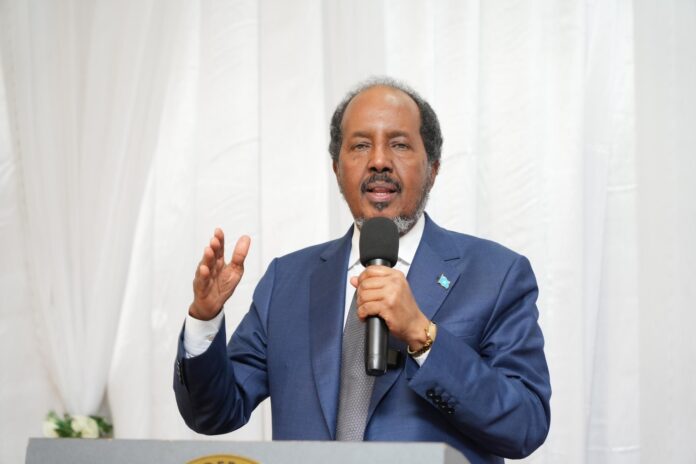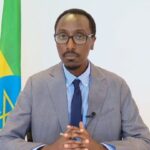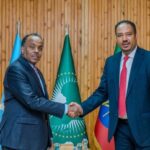MOGADISHU, Somalia — In a bold statement delivered at a mosque within the presidential palace after Friday prayers, Somali President Hassan Sheikh Mohamud pledged his administration’s unwavering commitment to holding direct, one-person, one-vote elections across the nation by 2026. This promise comes amid ongoing political tensions and security challenges in the Horn of Africa country.
Mohamud sharply criticized the recent re-election of Ahmed Madobe as President of the semi-autonomous state of Jubaland, branding the electoral process as “illegal” and a setback in the country’s journey towards democratic governance. “The re-election was conducted in a manner that undermines our collective goal of achieving a fair and transparent voting system,” Mohamud said.
The Somali leader took direct aim at Madobe’s leadership, accusing him of failing to make significant strides against the Al-Shabaab militant group, which remains a potent threat in the region. “Ahmed Madobe has been in Jubaland for 13 years and has never liberated a single area from Al-Shabaab,” Mohamud declared, suggesting that Madobe’s re-election was more about maintaining power than advancing the security or democratic process in Jubaland.
Further escalating the political rhetoric, Mohamud accused Madobe of deliberately obstructing the path to direct elections by opting for an indirect election in Kismayo, the capital of Jubaland. “This move is a clear attempt to undermine the popular vote plans and keep control through undemocratic means,” he asserted.
The president’s comments have reignited debates over federalism, regional autonomy, and the central government’s authority in Somalia, where governance is often complicated by clan-based politics and regional power struggles.
The response from Jubaland has been swift, with officials defending Madobe’s re-election as legitimate under the current regional constitution and pointing to his efforts in maintaining relative stability in the face of Al-Shabaab attacks. Critics of Mohamud’s speech argue that his focus on Madobe detracts from broader national issues like security, economic recovery, and the integration of Somalia’s diverse regions.
Political analysts are watching closely, noting that this public confrontation could either lead to a more unified push for national elections or further entrench regional divisions. The call for direct elections by 2026 is seen as a litmus test for Mohamud’s administration to navigate through Somalia’s complex political landscape, where traditional power structures and modern democratic aspirations often clash.
As Somalia continues its fragile transition towards democracy, the international community, including the African Union and the United Nations, has expressed support for transparent and inclusive electoral processes. However, implementing such reforms in a country with a history of civil conflict, clan divisions, and insurgency presents significant challenges.
The next steps will be closely monitored, with many hoping that dialogue, rather than confrontation, will pave the way for a more stable and democratic Somalia.





